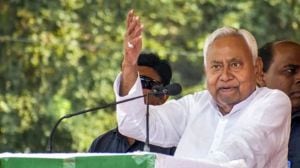Aishwarya Khosla is a journalist, currently serving as Deputy Copy Editor at The Indian Express. Her writings examine the interplay of culture, identity, and politics. She began her career at the Hindustan Times, where she covered books, theatre, culture, and the Punjabi diaspora. Her editorial expertise spans the Jammu and Kashmir, Himachal Pradesh, Chandigarh, Punjab and Online desks. She was the recipient of the The Nehru Fellowship in Politics and Elections, where she studied political campaigns, policy research, political strategy and communications for a year. She pens The Indian Express newsletter, Meanwhile, Back Home. Write to her at aishwaryakhosla.ak@gmail.com or aishwarya.khosla@indianexpress.com. You can follow her on Instagram: @ink_and_ideology, and X: @KhoslaAishwarya. ... Read More
Mahmood and Zohran Mamdani. Two generations. One question: Can power repair injustice?
As Mahmood Mamdani’s 'Slow Poison' ignites debate over Africa’s postcolonial past, his son Zohran Mamdani’s New York mayoral bid brings that legacy into the present. These are two generations wrestling with how power shapes justice.
 Zohran Mamdani with his parents renowned scholar and Columbia University professor Mahmood Mamdani and Oscar-nominated filmmaker Mira Nair. (Source: Instagram / @pagliji)
Zohran Mamdani with his parents renowned scholar and Columbia University professor Mahmood Mamdani and Oscar-nominated filmmaker Mira Nair. (Source: Instagram / @pagliji)As New York City votes for its next mayor on November 4, 2025, the campaign of Zohran Mamdani, a Democratic state assemblyman from Queens, coincides with an intellectual discourse surrounding his father, Mahmood Mamdani. The elder Mamdani’s new book, Slow Poison: Idi Amin, Yoweri Museveni, and the Making of the Ugandan State (Belknap Press, 2025), has divided readers everywhere be it Kampala or Cambridge, for its unsparing view of African post-colonial history.
Mahmood Mamdani, a Ugandan of Indian descent and professor at Columbia University, has spent a lifetime examining the legacies of empire. Expelled from Uganda in 1972, when Idi Amin ordered out the country’s Asian minority, he turned exile into scholarship. Slow Poison revisits that period, arguing that Amin’s brutality cannot be separated from the colonial structures he inherited. The book describes how both Amin and his successor Yoweri Museveni used violence to consolidate power, though in different ways. Amin through racial nationalism, Museveni through neoliberal fragmentation.
What the critics say
 Slow Poison is Mahmood Mamdani’s firsthand report on the tragic unraveling of his country’s struggle for decolonialisation. (Source: amazon.in)
Slow Poison is Mahmood Mamdani’s firsthand report on the tragic unraveling of his country’s struggle for decolonialisation. (Source: amazon.in)
Reactions have been sharp. In The Wall Street Journal, Tunku Varadarajan called Slow Poison “an apologia for Uganda’s Idi Amin, a bloodthirsty tyrant like few others in modern history,” faulting Mamdani for treating Amin’s atrocities as “palatable…in the service of a fledgling post-colonial nation.” Yet Mamdani’s intent, as he explains, is not to excuse but to historicise, to show how colonial patterns of rule survived independence and still shape African states.
A different reading came from Kelefa Sanneh in The New Yorker, who placed Slow Poison alongside Howard W French’s The Second Emancipation, a study of Ghana’s Kwame Nkrumah. Sanneh called Mamdani’s book an “acerbic sequel” to French’s work. Where French recreates the optimism of the independence era, Mamdani examines the turmoil that followed. Together, they trace the continent’s trajectory from the dream of self-rule to the realities of authoritarianism and economic dependency.
An intellectual legacy
 Zohran Mamdani celebrating his primary election victory in New York, joined by his parents. Renowned scholar and Columbia University professor Mahmood Mamdani and Oscar-nominated filmmaker Mira Nair, and his wife, Rama Duwaji. (Reuters)
Zohran Mamdani celebrating his primary election victory in New York, joined by his parents. Renowned scholar and Columbia University professor Mahmood Mamdani and Oscar-nominated filmmaker Mira Nair, and his wife, Rama Duwaji. (Reuters)
For Zohran Mamdani, that intellectual legacy is personal. Born in Kampala and raised in New York, he carries a middle name, Kwame, chosen in honor of Nkrumah. His mayoral platform emphasises housing justice, public transit, and economic equality, but observers note echoes of his father’s preoccupation with power and belonging. As the mayoral candidate, he is promising to make “the city work for everyone.”
That convergence of politics and scholarship has become strikingly visible in recent weeks. As Zohran Mamdani faced Islamophobic attacks on the campaign trail, amplified by rivals such as Andrew Cuomo and Curtis Sliwa, his defense of his faith echoes the analytical stance his father once took in Good Muslim, Bad Muslim. In that 2004 work, Mahmood Mamdani dismantled the binary that separated “good” from “bad” Muslims in Western political thought.
Two decades later, his son faces that same binary in practice, as a Muslim candidate navigating New York’s political mainstream. The younger Mamdani’s call to reject “the tolerance of indignity” resonates as a lived continuation of his father’s critique of empire, suggesting that for both men, the struggle against prejudice — whether colonial or civic — is inseparable from the project of justice itself.
While his father has published a book re-examining the failures of African Independence, the son is campaigning to reform a 21st century metropolis still struggling with its own inequities. One writes about dismantling colonial hierarchies, the other tries to confront urban ones. Both, in different languages, ask the same question: how power might be used to repair, rather than reproduce, injustice.
References
Mahmood Mamdani, Slow Poison (Belknap Press, 2025);
Tunku Varadarajan, The Wall Street Journal, Oct 15 2025;
Kelefa Sanneh, The New Yorker, Oct 6 2025.


- 01
- 02
- 03
- 04
- 05






























